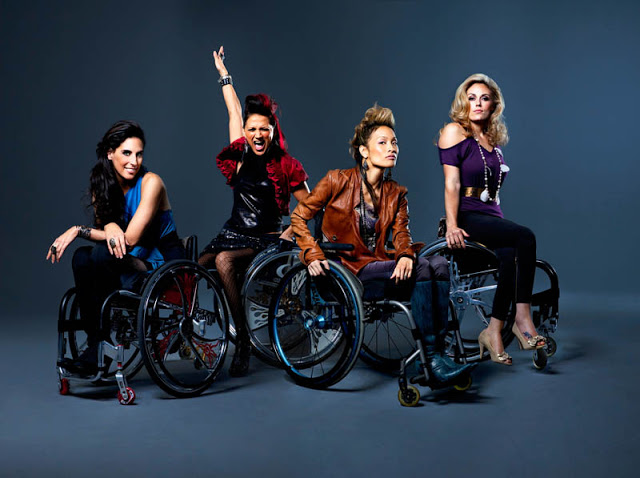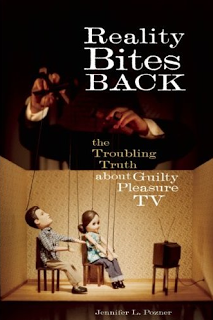 |
| Promotional poster for the new reality TV series Push Girls |
A new reality TV show called Push Girls, starring four disabled women in wheelchairs, premiered on the Sundance Channel last night. And it’s gotten glowing reviews.
Angela is a stunning model, Auti is a dancer who is trying for a baby, Tiphany is designing a clothes line and Mia works as a graphic designer.
And all four women are paralyzed from the neck or waist down and are about to shatter widespread notions of what it’s like to spend life in a wheelchair.
“Push Girls”, launching on the Sundance Channel on Monday, chronicles the lives of the ambitious and dynamic quartet in a way that producers say has never before been seen on U.S. television.
“Plenty of people have no idea what it’s like to spend the day in the life of someone with a disability, let alone a spinal cord injury,” said Tiphany Adams, 29, who was paralyzed in a horrific 2000 car accident.
“How do we get in and out of a car? How do we go to the bathroom. How do we go grocery shopping? How do we get in the shower? How do we get dressed? I thought it was a brilliant idea for the world to see that,” she said.
Told without self-pity, “Push Girls” shows the women going about their lives in Los Angeles just like other good-looking females in their 20s, 30s and 40s – flirting, going to nightclubs, in bed with boyfriends, chatting about love lives and searching their souls about the future.
But television is a visual medium, and one point the show makes with breathtaking rapidity is that tragedy can interrupt even the most seemingly charmed life. The other, more important point is that it can be just that — an interruption rather than an off-the-rails ending.
“If I can’t stand up, I’m going to stand out,” says one of the women toward the end of the pilot, and that would appear to be its theme.
Where others might have chosen to follow the overtly emotional, “The Other Side of the Mountain”-type story line of agonizing transition from able-bodied to physically challenged, this show does not. Instead, it chooses women who have been in their chairs for at least 10 years — which shows in the grace and ease with which they operate their chairs and perform tasks that, to the able-bodied, would seem impossible without full mobility.
Let’s say this first: Popular television is bad at lots of things, and one of them is representations of people with disabilities. Even where they’re present – Artie on Glee, or Walter, Jr. on Breaking Bad – they tend to be in isolation. When there’s more than one person in a wheelchair, for instance, like when Jason Street was in rehab on Friday Night Lights, the story is usually about the disability itself.
I sat down to think about the last time I saw television pass a sort of invented variation (not parallel, but similar in intent) on the Bechdel test: two people with disabilities talking in depth about things other than their disabilities. I’m sure it’s happened, but I strained to think of examples.
It’s still a reality show, like many others. It’s still a reality show about people who are way too hot to be representative of the population, and about people who gossip about each other and share more personal details than most of us would. To a degree, it truly does just happen to be a show about people in wheelchairs, and that’s probably the best thing it could be.
The premiere episode tends to lapse into a “You go, girl” mode typical of shallow treatments of disability, with fist-pumping and treacly background music. It’s a tone that subtly demeans, suggesting that simple things like having head shots taken (Ms. Rockwood is trying to restart a modeling career) must be applauded because, golly, for someone in a wheelchair to do anything other than sit there is a triumph.
A little of that may be necessary to hook an audience that has come to expect this treatment whenever a person with a disability turns up on television, but the faster this show sheds that tone and its preoccupation with sex, the more useful it will be. There are numerous other things we’d like to know about these interesting women besides the particulars of their love lives: their finances, their experiences on the job, their journey to get to the confidence level they seem to have achieved, their hopes for new technologies and medical breakthroughs.
Another challenge for “Push Girls” is dispelling the impression that these women are representative. Certain viewers might well look at them and conclude, “Gorgeous, smart, independent; I guess the disabled-Americans problem has been solved, so I can go back to not thinking about it.”
Over dinner in Beverly Hills recently, the sisterhood was palpable. Funny and vibrant, the women were as quick to tease each other over entrée choices as they were to argue over who looks the most beautiful when she wakes up in the morning. The tears flowed just as easily when the conversation turned to what their friendship means, and not just for the women. Even Chelsie’s father, Jon Hill, and Rockwood’s caregiver, Aunty Judy, became misty-eyed a couple of times.
“It was such a turning point for Chelsie to meet them all at one time,” Jon Hill said. “She’s always been a happy kid, but when she met the girls and we left there, she was singing and dancing in the car. Just pumped up. That’s what I needed to see. Even though she wasn’t depressed, it was just finding that right niche so she wouldn’t be sitting at home in the chair. It’s helped me tremendously being around these ladies.”
A more subtle aspect of the show is seeing how others react to the Push Girls: from rudeness to confusion, there are many levels of discomfort on display among the able-bodied people featured. How the women deal with the awkwardness varies within the group, but it’s one of the more moving subtexts. There’s a mixture of duty and fatigue when Angela talks a photographer through the reality of her leg spasms as he puts on an awkward grin, unsure of how to handle the fact that she could, at any moment, “stroke out.”
The series starts off with the women beginning their very L.A.-flavored journeys toward starting (or restarting) their careers, and there’s something captivating in that struggle even beyond the affecting nature of seeing these women work to transcend their disabilities. Despite the leisurely pace of the filming, which lacks a certain amount of dramatic tension, there’s a fiery spirit to Push Girls that cannot be ignored.


